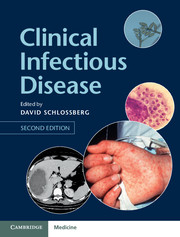Book contents
- Frontmatter
- Dedication
- Contents
- List of Contributors
- Preface
- Part I Clinical syndromes: general
- 1 Fever of unknown origin (FUO)
- 2 Sepsis, severe sepsis, and septic shock
- 3 Chronic fatigue syndrome
- Part II Clinical syndromes: head and neck
- Part III Clinical syndromes: eye
- Part IV Clinical syndromes: skin and lymph nodes
- Part V Clinical syndromes: respiratory tract
- Part VI Clinical syndromes: heart and blood vessels
- Part VII Clinical syndromes: gastrointestinal tract, liver, and abdomen
- Part VIII Clinical syndromes: genitourinary tract
- Part IX Clinical syndromes: musculoskeletal system
- Part X Clinical syndromes: neurologic system
- Part XI The susceptible host
- Part XII HIV
- Part XIII Nosocomial infection
- Part XIV Infections related to surgery and trauma
- Part XV Prevention of infection
- Part XVI Travel and recreation
- Part XVII Bioterrorism
- Part XVIII Specific organisms: bacteria
- Part XIX Specific organisms: spirochetes
- Part XX Specific organisms: Mycoplasma and Chlamydia
- Part XXI Specific organisms: Rickettsia, Ehrlichia, and Anaplasma
- Part XXII Specific organisms: fungi
- Part XXIII Specific organisms: viruses
- Part XXIV Specific organisms: parasites
- Part XXV Antimicrobial therapy: general considerations
- Index
- References
3 - Chronic fatigue syndrome
from Part I - Clinical syndromes: general
Published online by Cambridge University Press: 05 April 2015
- Frontmatter
- Dedication
- Contents
- List of Contributors
- Preface
- Part I Clinical syndromes: general
- 1 Fever of unknown origin (FUO)
- 2 Sepsis, severe sepsis, and septic shock
- 3 Chronic fatigue syndrome
- Part II Clinical syndromes: head and neck
- Part III Clinical syndromes: eye
- Part IV Clinical syndromes: skin and lymph nodes
- Part V Clinical syndromes: respiratory tract
- Part VI Clinical syndromes: heart and blood vessels
- Part VII Clinical syndromes: gastrointestinal tract, liver, and abdomen
- Part VIII Clinical syndromes: genitourinary tract
- Part IX Clinical syndromes: musculoskeletal system
- Part X Clinical syndromes: neurologic system
- Part XI The susceptible host
- Part XII HIV
- Part XIII Nosocomial infection
- Part XIV Infections related to surgery and trauma
- Part XV Prevention of infection
- Part XVI Travel and recreation
- Part XVII Bioterrorism
- Part XVIII Specific organisms: bacteria
- Part XIX Specific organisms: spirochetes
- Part XX Specific organisms: Mycoplasma and Chlamydia
- Part XXI Specific organisms: Rickettsia, Ehrlichia, and Anaplasma
- Part XXII Specific organisms: fungi
- Part XXIII Specific organisms: viruses
- Part XXIV Specific organisms: parasites
- Part XXV Antimicrobial therapy: general considerations
- Index
- References
Summary
Introduction: nature of the syndrome
Chronic fatigue syndrome (CFS) is a syndrome of subjective complaints, most prominently featuring profound and prolonged physical exhaustion. Many experts suggest that this syndrome is the late-twentieth-century formulation of an illness that has been described under various designations in medical literature for centuries, such as febricula (“little fevers”) in the eighteenth century, neurasthenia in the nineteenth century, and myalgic encephalomyelitis (ME), in Great Britain and Canada, or chronic fatigue and immune dysfunction syndrome (CFIDS), in the United States, during the late twentieth century. The designation chronic fatigue syndrome was adopted by the Centers for Disease Control and Prevention (CDC) and the National Institutes of Health (NIH) because this name does not assume a direct role for infection, inflammation, or immune system dysfunction in the genesis of the symptoms. Indeed, an abundance of research has failed to attribute the syndrome to any specific infection or immunologic disturbance. Nevertheless, CFS concerns infectious disease physicians because it is frequently recognized as a sequel of infection, i.e., as postviral or postinfectious fatigue.
The association of chronic fatigue and infection was first studied systematically in a study of chronic brucellosis. In a 1951 study, Wesley Spink found that 20% of patients with serologic evidence of brucellosis went on to develop persistent fatigue, muscle weakness, myalgia, mental confusion, and depression without evidence of ongoing infection with Brucella. He suggested that the symptoms of chronic brucellosis depended on both a previous Brucella infection and a psychological predisposition. Evidence for this theory was provided by investigators from Johns Hopkins during the Asian influenza pandemic of 1957–1958. During that epidemic season, these investigators conducted a retrospective cohort analysis of military personnel and their dependents who had completed the Minnesota Multiphasic Personality Inventory (MMPI) prior to the epidemic. Prolonged convalescence after influenza was associated with unfavorable scores on the test. Moreover, the MMPI profiles of subjects with prolonged postinfluenza symptoms were nearly identical to MMPI profiles of the previously studied patients with chronic brucellosis. This observation implies that the persistent fatigue and associated symptoms may reflect a programmed response to a variety of different infections in predisposed subjects.
- Type
- Chapter
- Information
- Clinical Infectious Disease , pp. 24 - 31Publisher: Cambridge University PressPrint publication year: 2015



